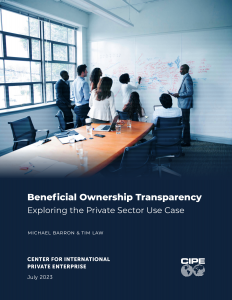Why Beneficial Ownership Transparency is Essential for Compliance
 Beneficial ownership transparency is a vital element of any effective corporate compliance program. It is also a powerful check against corruption in society generally. These two facts are sometimes misunderstood or obscured, especially in highly corrupt countries where economic and political elites don’t welcome transparency. A new report from the Center for International Private Enterprise, “Beneficial Ownership Transparency — Exploring the Private Sector Use Case,” leaves no doubt: Beneficial ownership transparency is good for companies and the countries where they operate.
Beneficial ownership transparency is a vital element of any effective corporate compliance program. It is also a powerful check against corruption in society generally. These two facts are sometimes misunderstood or obscured, especially in highly corrupt countries where economic and political elites don’t welcome transparency. A new report from the Center for International Private Enterprise, “Beneficial Ownership Transparency — Exploring the Private Sector Use Case,” leaves no doubt: Beneficial ownership transparency is good for companies and the countries where they operate.
One important benefit is cost savings. Evidence from the U.K. register supports the claim that small and medium-sized enterprises (SMEs) that access beneficial ownership data in the U.K. save money. Access to the data allows SMEs to spend less money on due diligence processes when they investigate potential business partners. This creates an estimated annual cost savings of about GBP2,000 (USD $2,440) annually for each user, or a total of about GBP1 billion to GBP3 billion (USD $1.2 — 3.7 billion). For companies, accurate and accessible beneficial ownership information provides clarity on who controls a company, the names of a company’s business partners, and any conflicts of interest or corrupt activity.
Globally, 125 governments have committed to establishing central registers to house and share beneficial ownership (BO) information, and 58 have begun implementation. Making this information publicly available assists a range of stakeholders, including governments, businesses, and civil society. Stakeholders are empowered to manage risk, secure investments, reduce corruption, promote development, and build trust.
 CIPE’s new Beneficial Ownership Transparency report explains the range of use cases BO data has within the private sector, examining both the company-level and economy-wide benefits. The report contributes to advancing the understanding of the diverse roles the business community can play in advancing BOT, as well as of the wide-ranging benefits of BOT to private enterprise. As the authors of the report write, “BOT is particularly valuable for SMEs, who may not have the resources to commission high-cost external due diligence from third-party providers.”
CIPE’s new Beneficial Ownership Transparency report explains the range of use cases BO data has within the private sector, examining both the company-level and economy-wide benefits. The report contributes to advancing the understanding of the diverse roles the business community can play in advancing BOT, as well as of the wide-ranging benefits of BOT to private enterprise. As the authors of the report write, “BOT is particularly valuable for SMEs, who may not have the resources to commission high-cost external due diligence from third-party providers.”
In many countries, the private sector does not yet benefit from verified and accessible information because registers are closed to the public, information is outdated, or data quality is otherwise limited. To remedy this, more needs to be done: the report explores how the benefits of BO reform could be better communicated between stakeholders, using insights gleaned from three countries: Armenia, Kenya, and Senegal.
The Beneficial Ownership Transparency report marks the next chapter of CIPE’s support for the BO community. The authors of the report encourage key private sector stakeholders to join the coalition vested in reform efforts. The publication provides recommendations on how BO advocates can engage with the business community in a variety of contexts to pursue viable reforms in countries around the world. The report can be downloaded here.
